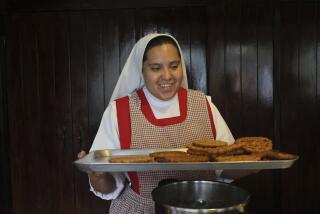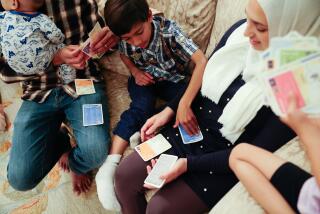Monastic Community Provides Home for Children With AIDS : Ministry: Starcross, a group of lay Catholics, sees its work as clearly linked to a Christian commitment to tend to the sick.
- Share via
ANNAPOLIS, Calif. — Aaron was just over a year old when he died, the day after cutting his first tooth. During the first nine months of his short and troubled life, he had been shuffled from hospital to hospital, but no one knew what to do with an AIDS victim this young.
Aaron’s teen-age mother, a prostitute from a small desert town, had cared for him briefly, but she was guilt-ridden and sick herself. So she sent her son to live at Starcross farm.
Aaron was one of a houseful of children with AIDS cared for by the Starcross community, a group of four monastic lay Catholics who take vows of poverty, chastity and obedience similar to those taken by members of religious orders.
The Starcross Catholics did not plan to become a home for sick children. The community was formed in 1967 by two people on a spiritual quest--Tolbert McCarroll, a former lawyer and widower who left his white-collar life in the Midwest and moved to California, and Marti Aggeler, a woman who had dabbled in motorcycle clubs and encounter groups before she divorced her stockbroker husband and began work as an administrator in San Francisco’s Humanist Institute. The two, now known as Brother Toby and Sister Marti, met at the Humanist Institute and decided to live as celibate monks in an old house in the city.
Several years later they bought a 115-acre farm in Sonoma County, intending to combine a simpler and more rural life with quiet prayer.
Soon they were joined by Sister Julie de Rossi, who had grown up in an Italian Catholic family, studied Zen, aikido, piano and dance, and worked as a counselor for disturbed boys. More recently, Sister Cecelia Le, 26, signed on as a novice. A Vietnamese “boat person” who had found her way from Hong Kong Harbor to the United States, she is by far the youngest member.
The monks think of themselves as profoundly Catholic, yet they attended no church seminaries and have no official ties with the Catholic hierarchy. Starcross members think of themselves more as a monastic community than an AIDS hospice.
“We certainly didn’t start out looking for a ministry,” Sister Julie said. Rather, she added, they saw themselves as “a spiritual family” that later found they had room for children.
Members balance a life of quiet dedication to God with harvesting fruit and evergreens, driving children to doctors and throwing frequent parties for the children. They work with volunteers of many backgrounds and beliefs.
While most monks try to isolate themselves from the world, Brother Toby said Starcross members see their work with children as clearly linked to their Christian commitment, as “natural for followers of the man who urged us to tend the sick.”
“There’s absolutely nothing as contemplative as being with a child who is dying,” he said.
The group started its innovative program in the mid-1980s after Sister Marti wept as she watched a newscast about babies with AIDS. Many of the babies had been abandoned in hospital wards. The group decided to take in several infants and gradually began offering a home-care program resembling a family farm more than a hospice.
Receiving attention from national television when they first launched the program, Starcross members had two convictions: that every child deserves a stable and happy home, and that even the briefest of lives is to be cherished.
“This place is no different from anyplace else where children live,” Brother Toby said, sitting in an armchair in his cottage behind the farmhouse.
Blackberry brambles and apple orchards sprawl over the community’s acreage, as do evergreens, which members sell for Christmas trees. Out back lives a guanaco, an animal similar to a llama, and many cats.
Melissa attends a local parochial school; she must wear a uniform and do her homework. Vicki goes to a special education school, while Matthew attends Montessori school and practices the violin every day. Rachel, not yet 3, “helps” with household chores, and 1-year-old Todd has just learned to walk.
Starcross also runs several training programs for parents who care for their sick children at home and a biweekly support group for others who care for children with AIDS. The community’s members offer help to caretakers in nearby areas and respond by telephone or mail to questions related to AIDS ministry, religion and death and loss.
From their farm in rural California members also oversee an AIDS hospice program for children in Romania, which they started after the horrors suffered by Romanian orphans during the Nicolae Ceausescu regime came to light in 1990.
The community’s funding comes mostly from Christmas tree and wreath sales, supplemented by grants from international Catholic relief organizations, small monasteries and individual supporters.
Starcross members do not seek to be public leaders. They have withdrawn from AIDS commissions and have declined most press interviews for the past couple of years. Still, they welcome contact from Catholics who are seeking help or feel alienated from the church because of divorce, sexual orientation or other reasons. The four community members see themselves as “anticlerical” and “nonjuridical,” as they believe monks should be.
“The spirit is moving through the church,” Brother Toby proclaimed, “but it’s now moving in broader areas than the hierarchy.”
Starcross members gather at 7 a.m. for meditation and singing, at midday for a Eucharistic service (priests visit about once a month, blessing enough wafers for Communion that month), at 5 p.m. for vespers and at 9 p.m. for Compline. They celebrate religious holidays in ways that blend their rural and religious lifestyles. On Good Friday they mark the Stations of the Cross on back-yard trees. Thanksgiving means a chapel service and a bounty of homemade applesauce, pumpkin pie and canned pears. At Christmas, Todd plays with the figurines from a Nativity scene.
Every Sunday the children go to the tiny chapel on the hill, participating in a “dialogue homily” or acting out the day’s Gospel reading. The three oldest are preparing for First Communion.
As for Aaron, he found he suddenly had a family when he arrived. He squealed with delight as older children made a game of pulling off his socks, and at his first birthday party in December he had his first taste of ice cream. For the last few months of his life he breathed the clean air of Northern California.
Despite the pain, the four adults, who dedicate themselves in a prayer service to each new child who enters their lives, say they would not live any other way. “If you protect yourself from the pain,” Sister Marti said, smiling softly, “then you insulate yourself from the joy.”
More to Read
Sign up for Essential California
The most important California stories and recommendations in your inbox every morning.
You may occasionally receive promotional content from the Los Angeles Times.










